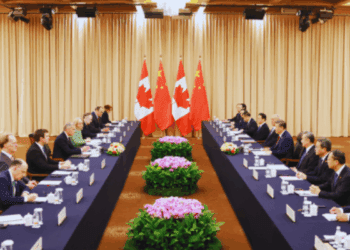 Ottawa should focus less on income redistribution and more on enabling economic opportunity, writes Sean Speer.
Ottawa should focus less on income redistribution and more on enabling economic opportunity, writes Sean Speer.
This column is based on Sean Speer’s recent paper called “Taxing the 1%: The limits of redistribution and a plan for inclusive growth.”
By Sean Speer, May 8, 2017
What is a “fair share”? How much is too much? What are the limits to income redistribution? These are among the major questions of today’s politics.
We saw this debate play out during the 2015 federal election and are witnessing it as part of the BC election campaign. The truth is it’s been with us for decades and it’s not going away.
Different Sun readers would invariably answer these questions differently. Divergent views reflect different values or preferences. Some emphasize equality more than freedom. Others choose efficiency over equity. This tension is never fully resolved.
But surely there are limits. Even NDP leader Thomas Mulcair equated marginal tax rates exceeding 50% as “confiscation.” And now more than half the provinces are, according to his formulation, in the business of confiscating individual wealth. Have we gone too far?
This is at the heart of the debate around “fair share” as the prime minister and his minister of finance frequently characterize it.
There’s reason to believe that we have gone too far. The rising tax burden – represented by, among other things, a later Tax Freedom Day – is undermining economic competitiveness and related outcomes such as investment, entrepreneurship, and job creation.
That the New Brunswick government had to reverse its hike to the province’s top tax rates and the Trudeau government has delayed plans to further raise taxes on high-income earners is a sign that policymakers realize we’ve crossed a proverbial line.
And it shouldn’t come as a surprise. It’s a widely-held view that if you tax something, you’re bound to get less of it. This is incidentally the underlying idea for a carbon tax. Putting a tax on carbon is supposed to lead to fewer emissions.
A better option is to shift our focus from a zero-sum debate about “fair share” to a broader one about enabling economic opportunity.
Yet, for some reason, we don’t tend to apply the same thinking to income taxes or capital taxes even though a major body of research shows the outcome is the same. Higher marginal tax rates lead to less economically-productive activities (such as work or investment), more tax planning, or both. There’s some debate about the extent but none about this basic premise.
A better option is to shift our focus from a zero-sum debate about “fair share” to a broader one about enabling economic opportunity. It’s not to say that we shouldn’t care about those with fewer opportunities or who need help climbing the economic ladder. But it is to say that’s different than pulling successful people down the ladder.
It’s ultimately about equality of opportunity rather than equalized results. This bottom-up vision should transcend some of these more intractable debates and bring the Left and Right together.
Most importantly: an agenda for broad-based opportunity or “inclusive growth”, as the Trudeau government has dubbed it, can also make a meaningful difference for those without pre-existing economic and social advantages. This is a preoccupation worthy of our politics.
Old debates about redistribution and all the rest aren’t going away. But that doesn’t mean we can’t focus on more important topics such as enabling greater economic opportunity for all Canadians. Doing so may cause us to discover that we agree on more than we realize.
Sean Speer is a Munk Senior Fellow at the Macdonald Laurier Institute.




